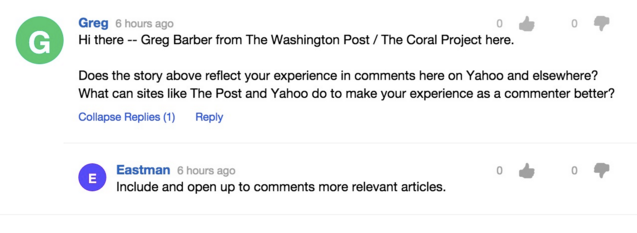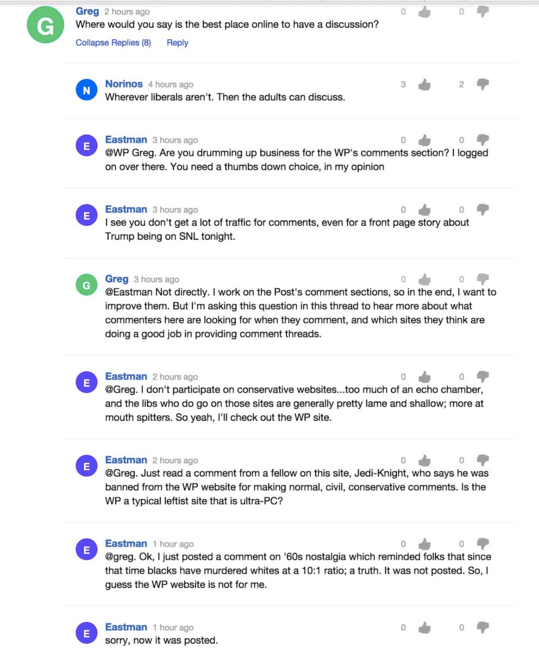Agence France-Presse published an article on Saturday headlined “Nastiness threatens online reader comments,” which discusses news organizations that have recently shut down their comment threads and recounts some recent research into elements of the commenting experience that could fuel incivility in interactive spaces.
(Full disclosure: the article includes a section interviewing me, discussing The Coral Project.)
Since AFP is a wire service, the article was featured on sites around the world, from the U.S. to France, Australia, and the Middle East. Many of those sites feature comments, and some readers took the opportunity to give their thoughts on the state of comments in news.
I found the largest and most rollicking swath of comments on a version of the story published on Yahoo, which was featured on the Drudge Report.
A wide set of those comments placed the article in a political frame.
“This is just the liberal media trying to crush opposing views,” said a commenter called Cheryl. “Conservatives are changing minds and won’t back down so media outlets are trying to shut them down.”
Some commenters pointed to anonymity in comment sections as a prime enabler of incivility.
“If you say that you want real dialogue and discussion, then make people stand up for their comments by putting their real identities behind what they say,” said a commenter called Bruce. “If you aren’t willing to stand up for your principles, then you should not be allowed to express them.”
But at least one disagreed.
“Losing anonymity means losing some useful commenters,” said a commenter called Rob. “Do you think that someone wants to relate their experience with (let’s say) rape and use their real name? Some might, most wouldn’t.”
Some users said comment threads were a key part of their news-consuming experience.
“I won’t bother with a news site that doesn’t provide an open forum,” said a commenter called Gary. “The anger and sheer stupidity that dominates some conversations is often disappointing and frustrating, but it’s better to deal with it than eliminate the conversation altogether.”
Yahoo allows likes and dislikes on its comments. Below are a few that had the most likes.
From a commenter called James:
Who would have even though it would be the freakin’ new media trying to crush free speech by the public citizens after all we have been almost forced to listen to a lot of BS from them for decades. I don’t go on news sites that don’t let people comment. I love nasty comments too. I still remember what the media did to Richard Jewell, the hero of the Atlanta Olympics that helped save countless people from getting blown up and the media slandered the man to no end and turned him into a criminal! RIP Richard Jewell, you deserved a hell of a lot better from your own government and the freakin’ news media!
From a commenter called MK:
I don’t bother reading articles that don’t contain comments sections, except for the very occasional news article on CNN (which has comments in its opinion section). I hesitate even to bother reading articles where the comments have to be filtered through moderators prior to being posted, since the outcome is the same: it destroys my ability to engage with or against those advocating various ideas.
Whether you are a liberal or a conservative in America, you can probably ascribe most of our nation’s problems to certain people and certain ideas. It’s important people be able to fight against those things they believe are leading us to ruin.
From a commenter called I AM:
The topic always sets the tone. I enjoy the comments as they are, nastiness and all. I want to [know] the intensity of people’s feelings on a topic, how strongly they feel about it. Censorship is just plain wrong and does a disservice to those that care enough to voice their heartfelt opinion. If you can’t stand the heat stay out (of the kitchen). No one is forcing anyone else to read the comments. Only those that wish to manipulate the minds of their readers would even consider censorship.
I asked a few questions in the thread, and I received a few responses. Below are screen grabs from those exchanges.


Click here to discuss this piece within The Coral Project Community.
Agence France-Presse published an article on Saturday headlined “Nastiness threatens online reader comments,” which discusses news organizations that have recently shut down their comment threads and recounts some recent research into elements of the commenting experience that could fuel incivility in interactive spaces.
(Full disclosure: the article includes a section interviewing me, discussing The Coral Project.)
Since AFP is a wire service, the article was featured on sites around the world, from the U.S. to France, Australia, and the Middle East. Many of those sites feature comments, and some readers took the opportunity to give their thoughts on the state of comments in news.
I found the largest and most rollicking swath of comments on a version of the story published on Yahoo, which was featured on the Drudge Report.
A wide set of those comments placed the article in a political frame.
“This is just the liberal media trying to crush opposing views,” said a commenter called Cheryl. “Conservatives are changing minds and won’t back down so media outlets are trying to shut them down.”
Some commenters pointed to anonymity in comment sections as a prime enabler of incivility.
“If you say that you want real dialogue and discussion, then make people stand up for their comments by putting their real identities behind what they say,” said a commenter called Bruce. “If you aren’t willing to stand up for your principles, then you should not be allowed to express them.”
But at least one disagreed.
“Losing anonymity means losing some useful commenters,” said a commenter called Rob. “Do you think that someone wants to relate their experience with (let’s say) rape and use their real name? Some might, most wouldn’t.”
Some users said comment threads were a key part of their news-consuming experience.
“I won’t bother with a news site that doesn’t provide an open forum,” said a commenter called Gary. “The anger and sheer stupidity that dominates some conversations is often disappointing and frustrating, but it’s better to deal with it than eliminate the conversation altogether.”
Yahoo allows likes and dislikes on its comments. Below are a few that had the most likes.
From a commenter called James:
From a commenter called MK:
From a commenter called I AM:
I asked a few questions in the thread, and I received a few responses. Below are screen grabs from those exchanges.
Click here to discuss this piece within The Coral Project Community.